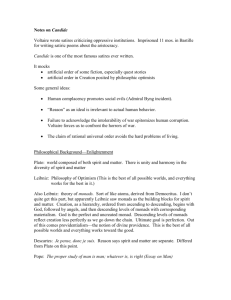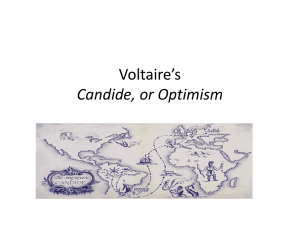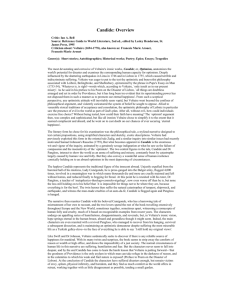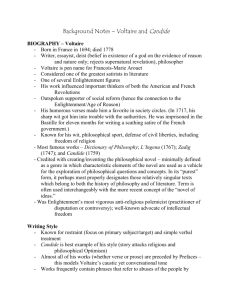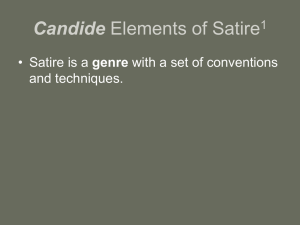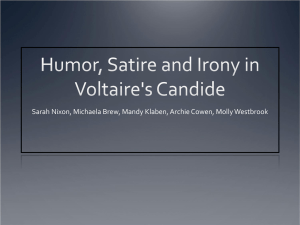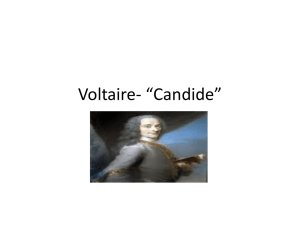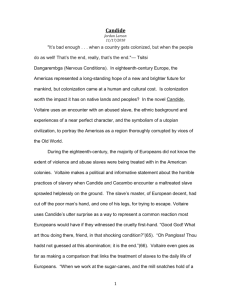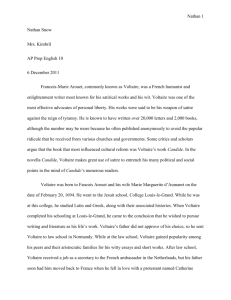Candide: Historical Events & Voltaire's Critique
advertisement
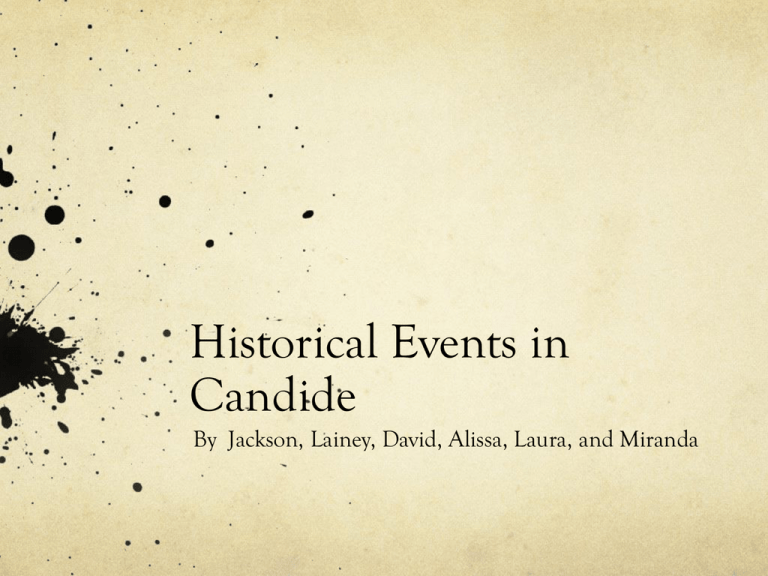
Historical Events in Candide By Jackson, Lainey, David, Alissa, Laura, and Miranda Lisbon Earthquake Many people during that time believed it occurred because the people of Lisbon had sinned. More than 250,000 people were attending church when it struck Took place on November 1. “All Saint’s Day” Impact of the Earthquake Between 30,000-60,000 people killed, a 5 day fire, a major port was destroyed. Enlightenment Voltaire included it to show people’s blind faith in God. Enlightenment the name for a movement that encompasses a wide variety of ideas and advances in the fields of philosophy, science, and medicine that began in the seventeenth century and peaked in the eighteenth century. Belief that people can actively work to create a better world Spirit of Social Reform Enlightenment in Candide Criticizes philosophical aspects of Enlightenment. Attacks optimism Illustrates this fact in the figure of the Grand Inquisitor who orders an auto-da-fé, or an "act of faith" that was a public condemnation and execution, to ward off earthquakes Called for education to be for everyone. 7 Years War Caused by colonial and trade empire conflicts Prussia, Britain and Hanover vs. Austria, France, and Russia. Britain made huge territorial gains in North America. Prussia kept most of it’s land because of Fredrick the Great. 1756-1763 The War in Candide Voltaire was alive during the war and very much against it. The war is seen in Chapter 3 of Candide when he is forced into the Bulgarian army who fights for the Prussians against the Abares of the French army. Voltaire starts to glorify the battle with the huge armies and honor of the soldiers and trumpets etc, and then hits us with reality by describing the gruesome outcomes. This displays Voltaire’s disapproval of the war. Execution of Admiral Byng Voltaire satirizes the execution of Admiral Byng in Candide. Voltaire uses chapter 23 to present his feelings on war. He greatly ridicules it and condemns it as wasteful of many resources, such as time, energy, and life. He makes clear that this war is pointless. Voltaire satirizes the general lack of consideration of other humans in the way they casually murder an admiral to push the others along. John Byng John Byng's epitaph reads as follows: “To the perpetual Disgrace of PUBLICK JUSTICE The Honble. JOHN BYNG Esqr Admiral of the Blue Fell a MARTYR to POLITICAL PERSECUTION March 14th in the year 1757 when BRAVERY and LOYALTY were Insufficient Securities For the Life and Honour of a NAVAL OFFICER” It exhibits the emotions felt not only by his family, but also the rest of the nation of Great Britain. This social injustice is clearly addressed by Voltaire in Candide. The Execution in Candide When Candide observes a firing squad execute a British Admiral in Portsmouth for being too far away from his enemy in a battle, he is told that "in this country it is found good, from time to time, to kill one admiral to encourage the others". This is found shocking to Candide, and it makes him want to go to Venice. Voltaire is quite clearly alluding to Admiral Byng's execution in this scene. It is clear that Voltaire held a strong opinion on Byng's execution, along with many other people. Candide and the Monadology “La Monadologie” was written by Gottfried Leibniz in 1714. Gottfried Leibniz -German mathematician and philosopher during the enlightenment period Consists of 90 paragraphs, depicting the metaphysics of monads Basic Ideas in the Text At the root of the concepts, there must be an understanding that there is a God. Monads are simple substances that can not be affected by anything else in the universe. All monads differ from one another and have specific qualities Pre-established Harmony The divine system the allows monads to be affected by other monads Must be put in place by God 3 types of Monads Inorganic: Confused understanding and reason about other monads Animals: Simple understanding, memory, and reason Humans: Complex reason, memory, understanding, self-consciousness, reflection Basic Philosophies Embodied in the Text Our world is the best of all possible worlds. God is infinitely good. God is omnipotent, yet limited. He can only cause possibilities to exist if there are no contradictions to refute it. Evil stems from the fact that every other monad aside from God is not the monad of God. How this Relates to Candide Pangloss is inspired by Voltaire’s perception of Leibniz. Voltaire viewed Leibnizian philosophy as arrogant and foolish Most characters believed that we live in the best of all possible worlds until the end All characters also experienced some form of significant suffering Voltaire allows Pangloss to repeatedly say, “All is well,” thus providing a satirical version of Leibnizian philosophy. Voltaire held Deistic beliefs, and therefore disagreed with the divine system of pre-established harmony. El Dorado Believed to be a place in the New World filled with immense wealth. Originated in South America, from a tribe chief who was “covered in gold dust” was named El Dorado by the Spaniards. It means “the gilded one”. The location of this city has shifted as new land has been discovered. Most notable searches for it were made by Francisco Vasquez de Coronado and Sir Walter Raleigh. All searches have been fruitless. El Dorado in Candide El Dorado was the only place in the entire book where suffering didn’t occur. It was used as a comparison to the immense suffering by all of the characters. It also was used by Voltaire to make fun of idealistic life views. He relates them to something imaginary. He does this by stretching these views to an unrealistic point, clearly displaying the negatives.
